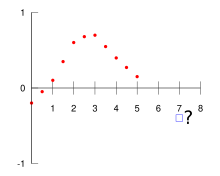In mathematics, extrapolation is a type of estimation, beyond the original observation range, of the value of a variable on the basis of its relationship with another variable. It is similar to interpolation, which produces estimates between known observations, but extrapolation is subject to greater uncertainty and a higher risk of producing meaningless results. Extrapolation may also mean extension of a method, assuming similar methods will be applicable. Extrapolation may also apply to human experience to project, extend, or expand known experience into an area not known or previously experienced. By doing so, one makes an assumption of the unknown[1] (for example, a driver may extrapolate road conditions beyond what is currently visible and these extrapolations may be correct or incorrect). The extrapolation method can be applied in the interior reconstruction problem.

- ^ Extrapolation, entry at Merriam–Webster
